Talks On Psychoanalysis
memories
Episodes
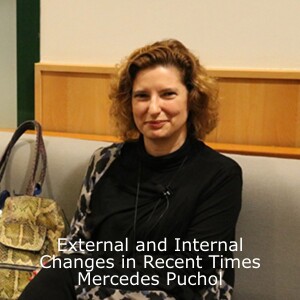
Monday Nov 21, 2022
Monday Nov 21, 2022
How do recent external and internal changes emerge in the theoretical-technical and clinical understanding of psychoanalysis today? How to think psychoanalytically about the topic of war today more than ever?
In this episode entitled External and internal changes in recent times, Mercedes Puchol reflects, among other things, on the impact of these changes in relation to remote analysis, and considers the notion of analysability, originally postulated by Carlos Paz in 1971, to be fundamental for thinking about all the challenges and questions that remote analysis raises.
Finally, the author, faced with the level of destruction and pain that the Russian invasion of Ukraine has caused, reflects on the importance of identifications in the "construction of emotional ties that operate against war (Freud, 1933)".
Mercedes Puchol is a clinical psychologist and psychoanalyst. She lives and works in Madrid with adults, children and adolescents. She is training analyst of the Madrid Psychoanalytical Association (APM) as well as its current President. She is a member of the Organising Committee of the Spanish Language Psychoanalysts Encounters and of the Committee of the European Psychoanalytic Conference for University Students (EPCUS).
Link to the paper https://docs.google.com/document/d/1mSeD-BL9yahdsV3XzfbovanCwRnXkp8S/edit?usp=share_link&ouid=112457875385152358388&rtpof=true&sd=true
This episode is available also in Spanish
This Podcast Series, published by the International Psychoanalytical Association, is part of the activities of the IPA Communication Committee and is produced by the IPA Podcast Editorial Team. Head of the Podcast Editorial Team is Gaetano Pellegrini. This episode was produced in collaboration with Ana Maria Martin Solar.
Editing and Post-Production: Massimiliano Guerrieri.
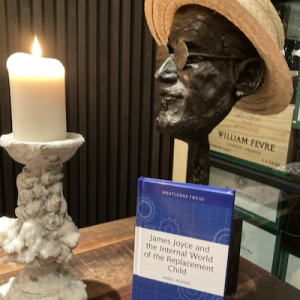
Monday Nov 07, 2022
Monday Nov 07, 2022
In this episode, Mary Adams delve into issues related to the trauma of being a replacement child. She illustrates this with the example of James Joyce, as "he seemed to overcome the debilitating effects of this early trauma and survivor guilt by using his writing".
Mary Adams is a psychoanalyst with the British Psychoanalytic Association, having completed her training in 1996. She was a training analyst with the Association of Child Psychotherapists, has a particular interest in the work of Donald Meltzer and has written several papers using his ideas. She is a past editor of the Journal of the British Association of Psychotherapy. Her book on James Joyce as a replacement child was published by Routledge in 2022.
Link to the paper https://docs.google.com/document/d/1-hL8XbcupQQXAwbwh4ow4hQkBwccIyTo/edit?usp=share_link&ouid=112457875385152358388&rtpof=true&sd=true
Further reading on the Replacement Child:
Anisfeld, L., & Richards, A. D. (2000). The replacement child: Variations on a theme in history and psychoanalysis. Psychoanalytic Study of the Child, 55: 301–318.
Capps, D. (2012). The Replacement Child: Solomonic Justice and the Sublimation of Sibling Envy American Imago, 69(3): 385-400
Pollock, G. H. (1972). Bertha Pappenheim's Pathological Mourning: Possible Effects of Childhood Sibling Loss. J. Amer. Psychoanal. Assn., 20:476-493
Pollock, G. H. (1978). On Siblings, Childhood Sibling Loss, and Creativity. Annual of Psychoanalysis 6:443-481
Reid, M. (1992). ‘Joshua — Life after death. The replacement child’, Journal of Child Psychotherapy, Vol. 18, 2. Pp. 109-138.
Sabbadini, A. (1988). The Replacement Child. Contemporary Psychoanalysis. 24: 528-547.
Schellinski , K. (2019). Individuation for Adult Replacement Children: Ways of Coming into Being. Routledge
Schwab, G. (2009). Replacement children: The transgenerational transmission of traumatic loss. American Imago 66 (3), 277-310.
Silver, D. (1983). The Dark Lady: Sibling loss and mourning in the Shakespearean sonnets. Psychoanalytic Inquiry, 3: (3): 513–527.
Storey, D. (2021). A Stinging Delight. David Story: A Memoir. Faber & Faber.
Whitebook, J. (2017). Freud. An Intellectual Biography. Cambridge UP
Wilson, E. (1988). Stendhal as a Replacement Child: The Theme of the Dead Child in Stendhal's Writings. Psychoanalytic Inquiry, 8:108-133
This Podcast Series, published by the International Psychoanalytical Association, is part of the activities of the IPA Communication Committee and is produced by the IPA Podcast Editorial Team. Head of the Podcast Editorial Team is Gaetano Pellegrini. Editing and Post-Production: Massimiliano Guerrieri.
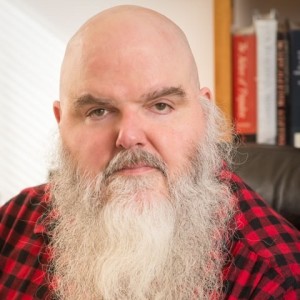
Monday Oct 03, 2022
Monday Oct 03, 2022
Veterans come home from war with shifted personalities, survival guilt after having lost comrades in battle, denial of feelings and shattered selves. A holding environment of safety if they ever had one is lost. How can a clinician gain the veteran’s trust and create the transitional space necessary for therapy that heals? In this podcast we will listen to Andrew Berry’s paper “The Interpersonal Psychoanalytic Approach to Working with Veterans where he takes a view of war veterans from an interpersonal perspective by seeking the deeper psychological meaning of posttraumatic stress disorder or PTSD. Exploring the veterans ‘relationships with others, provides meaning without which healing cannot be attained.
Andrew Berry holds a Ph.D., and a Psy.D. in psychology. He practices as a psychologist and psychoanalyst in Niskayuna, New York. He specializes in PTSD and other mental health needs of veterans. He has published on this topic and lectures at analytic institutes, and both national and international conferences. He completed a for year psychoanalytic program from the William Alanson White Institute in New York City in 2012.
Link to the original paper, published in Division Review. A Quarterly Psychoanalytic Forum in 2018. https://pep-web.org/search?preview=DR.018.0040A&q=Berry
This Podcast Series, published by the International Psychoanalytical Association, is part of the activities of the IPA Communication Committee and is produced by the IPA Podcast Editorial Team. Head of the Podcast Editorial Team is Gaetano Pellegrini. Editing and Postproduction: Massimiliano Guerrieri.
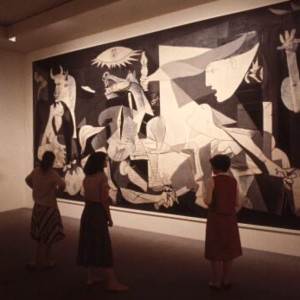
Monday Apr 04, 2022
Monday Apr 04, 2022
"Guernica" by Picasso at MOMA, NYC. Gotfryd, Bernard, photographer. Courtesy Library of Congress.
What happens when our basic trust in the world is challenged, and the social dimension of reality is disrupted as a consequence of collective trauma?In this episode, Werner Bohleber addresses the theme of traumatic experiences and does so starting from the two main models around which psychoanalytic thought has sought to understand trauma: the freudian psycho-economic model and the object-relational model.Reflecting on what he so effectively defines as "the symbolic web that carries us", Bohleber considers the implications of man-made disasters, and those that befall our individual and collective memory.
Werner Bohleber, Dr. phil, is a psychoanalyst in private practice in Frankfurt am Main. He is training analyst and former President of the German Psychoanalytical Association. He has long served on committees of the IPA, the last from 2009-2013 as Chair of the IPA Committee on Conceptual Integration. From 1997 to 2017 he was main editor of the journal PSYCHE. His research subjects and main publication themes are: late adolescence and young adulthood; psychoanalytic theory; transgenerational consequences of the Nazi period and the war on the second and third generation; nationalism, terrorism, anti-Semitism; trauma research. In 2007, he was awarded the Mary S. Sigourney Award for his diverse contributions, especially those relating to the traumatic aftermath of the Holocaust, National Socialism, and World War II.
link to the paper https://docs.google.com/document/d/18yMyiZ6darmN6ouxVoQmUwlci44UCnCQ/edit?usp=sharing&ouid=112457875385152358388&rtpof=true&sd=true
this episode is available also in German
Bibliography
Allen, J. (2013). Mentalizing in the development and treatment of attachment trauma. London: Karnac.
Amery J. (1996): Die Tortur. Merkur, 50, 502-515.
Balint M (1969). Trauma and object relationship. Int. J. Psycho-Anal. 50: 429-36.
Baranger M, Baranger W, Mom JM (1988). The infantile psychic trauma from us to Freud: Pure trauma, retroactivity and reconstruction. Int. J. Psycho-Anal. 69: 113-28.
Bohleber, W (2010). Destructiveness, Intersubjectivity, and Trauma. The Identity Crisis of Modern Psychoanalysis. London: Karnac.
Cooper, A. (1986), Toward a limited definition of psychic trauma. In: The Reconstruction of Trauma. Its Significance in Clinical Work, ed. A. Rothstein. Madison, CT: International Universities Press, pp. 41-56.
Erikson E.H. (1968): Identity. Youth and crisis. Nem York: Norton.
Ferenczi S (1949). Confusion of the tongues between the adults and the child [1933]. Int. J. Psycho-Anal. 30: 225-30.
Freud S (1920). Beyond the pleasure principle. Standard Edition 18, p. 7-64
Freud S (1926). Inhibitions, symptoms and anxiety. Standard Edition 20, p. 77-174.
Freud S. (1939). Moses and Monotheistism. SE 23: 1-138. (GW 16: 103–246)
Garland, C. (1998). Thinking about trauma. In: Garland, C. (Hg.). Understanding trauma. A psychoanalytic approach. London (Karnac).
Krystal, H. (1988). Integration and Self-Healing. Affect, Trauma, Alexithymia. Hillsdale: Analytic Press.
Langer L.L. (1995): Memory’s time: Chronology and duration in Holocaust testimonies. In: Langer, L.L.: Admitting the Holocaust: Collected essays. New York/Oxford: John Hopkins University Press, pp.13-23.
Leys R. (2000). Trauma: A genealogy. Chicago, Ill.: University of Chicago Press.
Morris D. J. (2015): The evil hours. A biography of post-traumatic stress disorder. Boston/New York: Houghton Mifflin Harcourt.
Oliner M. (2012): Psychic reality in context. Perspectives on psychoanalysis, personal history, and trauma. London: Karnac
Shalev A.Y. (1996), Stress Versus Traumatic stress. From Acute Homeostatic Reactions to Chronic Psychopathology. In: Traumatic Stress. The Effects of Overwhelming Experience on Mind, Body and Society, ed. B. van der Kolk, A., Mc Farlane & L.Weisaeth. New York NY: Guilford Press, pp. 77-101.
Steele BF (1994). Psychoanalysis and the maltreatment of children. J. Amer. Psychoanal. Assn. 42: 1001-25.
Van der Kolk B. (1996). Trauma and memory. In: B. van der Kolk, B., A. McFarlane & L. Weisath (Eds.) Traumatic stress. The effects of overwhelming experience on mind, body and society. New York: Guilford Press, pp. 279-302.
van der Kolk B. (2014): The body keeps the score. Mind, brain, and the body in the healing of trauma London: Penguin Books.
CREDITSEditing: Agustín Ruiz Brussain
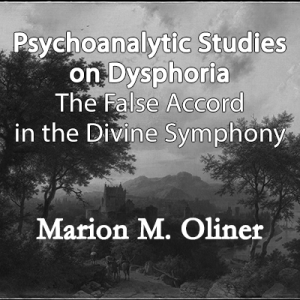
Thursday Sep 23, 2021
Thursday Sep 23, 2021
What is the role of external reality in the formation of traumatic experiences? And how much does this still determine the overcoming of the profound dysphoria that affects certain individuals?
With a highly personal and original view on the functioning of the mind from a psychoanalytic perspective, Marion Oliner accompanies us in this episode through a reflection on the impact of catastrophic events on the lives of individuals and th eir descendants.
Through her voice we will encounter Diderot, Proust and Baudelaire, Grubrich-Simitis and Winnicott; the tragedy of Nazism and the memorable beauty of the vineyards along the Rhine.
Marion M. Oliner has been active in her private practice, teaching, supervising, as a speaker, and as a member of many committees, as well as in the governance of the New York Freudian Society. She is a member of the International Psychoanalytic Association and on the faculty of the New York Freudian Society, the National Psychological Association for Psychoanalysis, and the Metropolitan Institute for Psychoanalytic Psychotherapy.
This episode is inspired by the book published in 2018 by Routledge, titled: "Psychoanalytic Studies on Dysphoria: The False Accord in the Divine Symphony".
link to the paper https://drive.google.com/file/d/1jUQ7U0ZAVNUS5TsWjxkCfv1UqDuJWG36/view?usp=sharing
Sunset on the Rhine, 1853. Barend Cornelis Koekkoek. Courtesy Met Museum, New York.
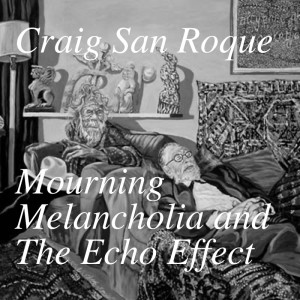
Tuesday Jun 29, 2021
Tuesday Jun 29, 2021
Interpretation of Dreams, by Rod Moss
Craig San Roque, community psychologist and psychotherapist has, for the past 30 years lived in Central Australia working within indigenous Australian circumstances. He has written many careful accounts of the existential realities of intercultural collaborations and tensions. Trained in London, with the Society for Analytical Psychology, he cautiously adapts and applies psychoanalytic insights to help negotiate the rough environment of Aboriginal/white Australian relations.Mourning Melancholia and The Echo Effect - on aspects of unconscious transference within black/white relations - is distilled from experience in a project co-developed with indigenous friends who are part of the Central Australian NPY Women’s Council, Uti Kulintjaku/Clear Thinking project, initiated by traditional healers (Ngangkari).
The Passion, by Rod Moss
References to the Uti Kulintjaku projects, including evaluations by Samantha Togni may be found through the NPY Women’s Council website - npywc.org.au - see section on Ngangkari-traditional healers and Uti Kulintjaku project.NPY Women’s Council is an Anangu led organisation that delivers heath, social and cultural services in the Ngaanyatjarra Pitjantjatjara Yankunytjatjara (NPY) region of Central Australia.
Link to the paper https://drive.google.com/file/d/1vCDPRxFRbe11hJh-N8pQzhE0fV7p-2tI/view?usp=sharing

Tuesday Dec 08, 2020
Tuesday Dec 08, 2020
In today’s episode, we’ll listen to Gregorio Kohon’s work on “Monuments and Denials: Creating and Re-creating History”, that follows on from his book on Reflections on the Aesthetic Experience - Psychoanalysis and the Uncanny.
It is argued that denials are daily events at all levels of human existence. Denials can also work in a negative way: memories, for example, can create events that might have never occurred; even if not true, mnemic inventions may still make sense and become meaningful. Historical and religious monuments are a case in point. They are political statements which work through denials, not always representing historical “truth”.
Gregorio Kohon is a Training Analyst from the British Psychoanalytical Society. He lived in Australia, where he co-founded (together with Valli Shaio Kohon) The Brisbane Centre for Psychoanalytic Studies. He published No Lost Certainties to be Recovered; Reflections on the Aesthetic Experience - Psychoanalysis and the Uncanny, and Considering the Nature of Psychoanalysis. He edited The British School of Psychoanalysis - The Independent Tradition; The Dead Mother - The Work of André Green; and British Psychoanalysis - New Perspectives in the Independent Tradition. He edited, together with Rosine Perelberg, The Greening of Psychoanalysis, and co-authored with André Green, Love and its Vicissitudes. His works have been translated into many languages. He is also a poet and a novelist.
Reflections on the Aesthetic Experience - Psychoanalysis and the Uncanny,Routledge (2015).
This episode is available also in Spanish